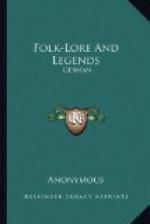When the gudeman came hame, he found the house so occupied with preparations for dinner, that he had nae time to ask his wife about her thread; and, before ever he had ance spoken to her on the subject, the company was announced at the hall door. The six ladies all came in a coach-and-six, and were as fine as princesses, but still wore their gowns of green. The gentleman was very polite, and showed them up the stair with a pair of wax candles in his hand. And so they all sat down to dinner, and conversation went on very pleasantly, till at length the husband, becoming familiar with them, said—
“Ladies, if it be not an uncivil question, I should like to know how it happens that all your mouths are turned away to one side?”
“Oh,” said ilk ane at ance, “it’s with our constant spin-spin-spinning.”
“Is that the case?” cried the gentleman; “then, John, Tam, and Dick, fie, go haste and burn every rock, and reel, and spinning-wheel in the house, for I’ll not have my wife to spoil her bonnie face with spin-spin-spinning.”
And so the lady lived happily with her gudeman all the rest of her days.
THE WEIRD OF THE THREE ARROWS.
Sir James Douglas, the companion of Bruce, and well known by his appellation of the “Black Douglas,” was once, during the hottest period of the exterminating war carried on by him and his colleague Randolph, against the English, stationed at Linthaughlee, near Jedburgh. He was resting, himself and his men after the toils of many days’ fighting-marches through Teviotdale; and, according to his custom, had walked round the tents, previous to retiring to the unquiet rest of a soldier’s bed. He stood for a few minutes at the entrance to his tent contemplating the scene before him, rendered more interesting by a clear moon, whose silver beams fell, in the silence of a night without a breath of wind, calmly on the slumbers of mortals destined to mix in the melee of dreadful war, perhaps on the morrow. As he stood gazing, irresolute whether to retire to rest or indulge longer in a train of thought not very suitable to a warrior who delighted in the spirit-stirring scenes of his profession, his eye was attracted by the figure of an old woman, who approached him with a trembling step, leaning on a staff, and holding in her left hand three English cloth-shaft arrows.
“You are he who is ca’ed the guid Sir James?” said the old woman.
“I am, good woman,” replied Sir James. “Why hast thou wandered from the sutler’s camp?”
“I dinna belang to the camp o’ the hoblers,” answered the woman. “I hae been a residenter in Linthaughlee since the day when King Alexander passed the door o’ my cottage wi’ his bonny French bride, wha was terrified awa’ frae Jedburgh by the death’s-head whilk appeared to her on the day o’ her marriage. What I hae suffered sin’ that day” (looking at the arrows in her hand) “lies between me an’ heaven.”




